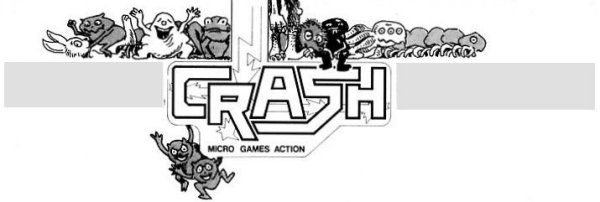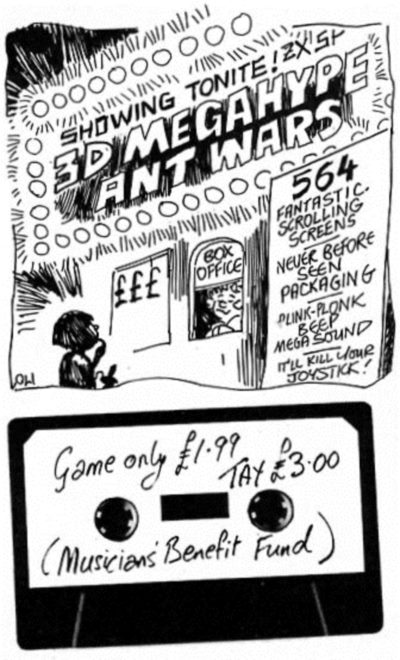



IN HIS introductory editorial this month, I notice Derek Brewster complains about the lack of decent software in shops; and again I have seen his reference to the difficulty many readers have experienced in trying to obtain the excellent adventure Out of the Shadows by Mizar (featured last month). At the annual Computer Trade Association’s ‘Award Dinner’ in February, Christian Penfold of Automata (who won the Best Program of the Year for Deus Ex Machina) took the opportunity of the ‘thank you’ speech to attack software distributors and retailers for the fact that at that time they had only been able to sell some 700 copies of the program. Christian might be interested, therefore — as well as CRASH readers, to note that Mizar have so far only been able to sell some 300 of their Out of the Shadows although it was CRASH Smashed and definitely a game Derek raved over.
In one of the computer trade papers (I think it was Computer Trade Weekly) a shop keeper replied to Penfold’s attack by saying that Deus Ex Machina simply did not sell when he put out three copies — it was not wanted by the public. This, of course, could well be true — very often the public do not want something that is both ‘very different’ and also a bit pricey; but the real point is being missed — with only 700 copies out on the shelves, its visibility is extremely tenuous. More praise, then, to the angry shop keeper who at least gave it a try. Mizar’s problem is really more serious, because in their case none of the major distributors agreed to distribute the game at all. You might think I’m taking it personally that a CRASH Smashed game should fail so spectacularly to get into the shops — well I am! And so, as readers of this magazine, should you, because it means that through the judgement (or lack of it) of a tiny handful of people you have been prevented from purchasing a game that it seems many of you want.
On talking to several people a month ago, I discovered that in the case of two distributors they had ‘assessed’ the game and found it ‘not suitable for the Christmas period’ — whatever that is supposed to mean. I take it that it means... ‘this isn’t an obviously big-selling arcade megazap thriller with a £10,000 promotion budget and besides that it’s an adventure game with graphics I don’t understand and we all know adventures never sell....’ The men at Microdealer UK were somewhat more thorough, sending their preview copy to an independent reviewer whose job is to assess the game’s marketing potential rather than, like Derek, its final player appeal. In all fairness (I’ve seen the report) the reviewer obviously liked the game a lot, pointed out what he felt to be some of its failings and remarked on the graphics which he felt might put some people off. But for Microdealer the clincher seemed to be that Mizar were a totally unknown company with a first game and no apparent promotion going behind it. Distributing it would be a risk.
To me this seems a terrible indictment of an industry that in only two and a half years has grown from back bedrooms. In the beginning all the great hits came from totally unknown companies with no promotion budgets, and the exciting part of it all is that the situation really hasn’t changed all that much. An important chunk of last year’s hits and advancements came from the same ‘amateur’ stable. But before all the major distributors throw their hands up in horror at my remarks here, I do want to dispel the commonly held belief of producers that distributors just sit in the middle raking in the money for no risk — the matter is too complex to suggest that the current problem is one of unimaginative money men selling only the product that will make them a fortune. All I am asking is that software distributors take more care in their selection and attempt to follow the trends of what the public may want rather than dictate it.
The problem Derek outlines in his piece is slightly different, though linked. There are both among the specialist computer shops and the large chain stores like WH Smith and J Menzies, managers, counter staff and buyers who are enthusiasts and who care. The following remarks are NOT aimed at them, for in their hearts they know who they are. Sadly they are few and far between, especially in the chain stores. It’s as though the computer business has gone stale for them. There’s an analogy here between software and the cinema. Falling attendances at cinemas during the 60s and 70s were put down to TV and the lack of general interest in movies — partially true. Equally proven, however, is that enthusiastic, intelligent and careful buying in of selected films made some cinema managers a big success. It’s time that the bigger shop managers really learnt something about the trade they are supposed to be operating and pulled their fingers out of that pension packet. It would be really nice to see software producers not having to cope with the appalling barriers put in the way of magazine publishers when it comes to selling product of the shelves of a shop which is supposed to be there for that very purpose. Perhaps we in Britain should take a lesson from across the water — where Americans always seem to want to say YES first, the British always want to say NO first and last.
THE DEBATE ABOUT levying a tax on blank cassette tapes has been rumbling since the technology was introduced. The argument is simple enough — blank tapes make pirating music off the radio or from the consequently reduced number of records sold too easy. Criminal piracy suddenly became the naturally done thing. People losing out are first the recording company, then the music publishers and finally the recording artists themselves. Solution: tax blank tapes and pay it as a royalty to the people who have lost out. Problems: there has never been a tax that doesn’t eat up a considerable part of its revenue simply through administering it; more importantly, perhaps, there is the moral dilemma — in Britain, thankfully, criminals are still considered innocent until the state has proved otherwise; but this levy is in reality a pre-paid fine which assumes that every purchaser of a blank cassette (audio or video) is a criminal. The Government is planning to introduce such a levy and indications are that it would be about 10% on audio tapes and 5% on videotapes. This in itself is illogical — are we to presume that buyers of blank videos are five percent’s worth less criminal? The Government’s green paper talks about film and music copyright holders, yet ignores the large quantity of blank tapes now being sold for the purposes of computer owners (not all of whom are pirates)!
Should I, in order to save my latest Quilled adventure game that has taken me ten days to write, have to pay a levy on the cassette on which I am about to save it so that Percy Pigshot and the Swillers, whose latest wailings on the radio have driven me mad over the ten days, may receive a royalty? Let’s face it, a law which is both unfair and unworkable should never be allowed to become law.

AT THE RISK of boring CRASH readers who are not interested in some of the more obscure (and usually unmentioned) background manoeuvrings, may I say that just at the moment I am a bit sick and tired of Advertising Agencies representing software houses both big and small. As per my earlier remarks about shops, those who behave properly know who they are — I do not refer to them. Those who are behaving badly also know who they are. In the past three months, two agencies handling large accounts have gone into liquidation, leaving CRASH (and other publications) with large debts. In both cases the clients behind the agencies had paid their CRASH bills to the agency, who had just never bothered to pass the payment on. Both agencies have taken a snotty-nosed ‘big London Ad Agency’ attitude when pressed for payment. One comment was, ‘We do not place our clients’ advertisements with magazines who try to be difficult.’ We were being difficult over the fact that we wanted payment with order in future because they already owed over six month’s worth of bills. The following month the company liquidated leaving behind a bill of over £6,000 mostly in the name of a client who has been a faithful supporter of CRASH from the first issue. Since it is the advertising revenue that supports the magazine (without it CRASH would have very little colour and about 20 pages of editorial), the attitudes of such agencies and their representatives directly affects the readership. If agencies do not want to place their clients’ advertisements in CRASH that is up to them. What is sickening is when they do place the ads, claim or even demand their high percentage discount (a traditional kickback that has become unwritten law), and then fail to pay the bills on time despite repeated requests and get stroppy when a block is put on them. All too often the client in whose name this is all being done, is unaware of what is going on, and the effect it has upon the close-knit team at CRASH who naturally become disaffected with that software house.
It is now eight months since CRASH went up in price from 75p to 85p. We were hoping to hold the cover price for a bit longer, but due to the disastrous state of the Pound against the Dollar, paper prices have increased dramatically (paper is bought in dollars). On top of that the annual round of pay increases for printers has come, and that extra cost is also passed on. Looking on the brighter side, it is expected that there will be no more paper increases this year, and of course we are all relieved that the Government did not put VAT on periodicals. As a consequence of the above, CRASH, from this issue, must go up to 95p. We trust you all appreciate the reasons, and that the extra 10p will not spoil your enjoyment.